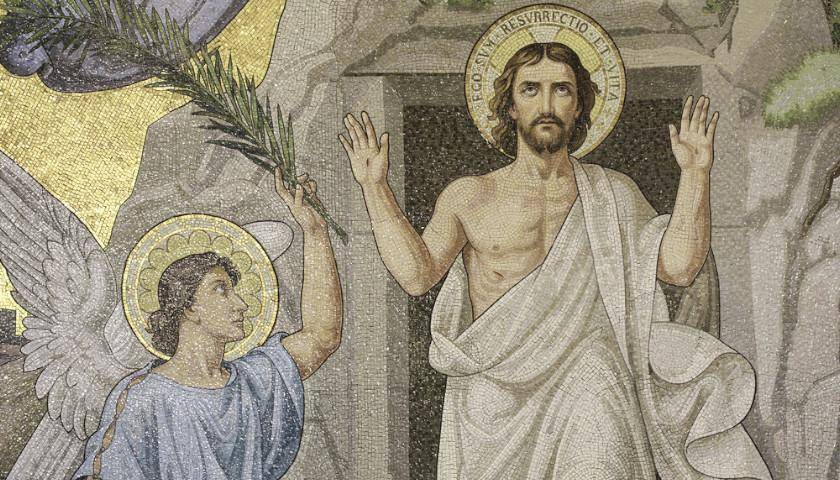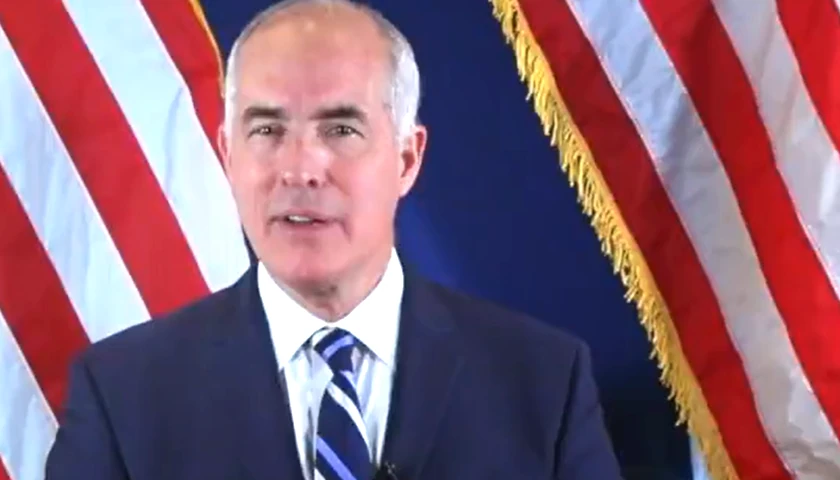by Scott Powell
Among world religions, only Christianity has a founder who professed to be the Messiah—the Son of God—who gave his life to save mankind.
The Easter weekend starts with Good Friday, the day God’s son Jesus was crucified to fulfill His plan to provide salvation from sin for those who believe in Christ. Easter Sunday is the celebration of Christ’s resurrection, the third day from his crucifixion death, and the completion of God’s plan for all to know who Jesus was.
Christ is also unique being the only figure in recorded history who was widely pre-announced before he was born. Over one hundred prophetic accounts from eighteen different prophets from the Old Testament—between the tenth and the fourth centuries BC—predicted the specifics of his coming birth, life, and death. Hundreds of years later, the details of Christ’s birth, life, betrayal, and death validated those prophecies in astonishingly accurate and minute detail.
All other religious founders came into the world to live, and their deaths brought an anticlimactic end to their lives and their work. But Christ came into the world to die, and his sacrifice was the ultimate climax of his life, done for the benefit of all mankind—opening the way to eternal life and a full relationship with God.
What also makes Christianity unique and inviting is there is no “entry” requirement of imperatives, rules, or rituals to join Christ’s family. All other religions have formalities and “works” that must be performed to qualify. Christ accepts us just as we are, and we need only acknowledge why we need him and invite him to come in to our lives.
Additionally, among other religions, only Christianity claims its founder is still alive, having overcome death through resurrection. No Jew has believed that, after Abraham died, his tomb ever became empty. After Buddha died, no disciple claimed to have seen or spoken to him again. As for Mohammed, the founder of Islam, no one ever saw him after he died. His occupied tomb in Medina is visited by scores of devout Muslim pilgrims every year.
In his three-year public ministry Jesus not only taught truth but modeled God’s love in unprecedented ways. There is no record of other religious founders and leaders showing love and compassion for misfits, outcasts, and the immoral, and healing the physically afflicted, and casting out demons from the deranged.
The resurrection was central to God’s providence because it provided “seeing is believing” evidence of God bringing Jesus the savior back from being dead in a tomb to being alive—resurrected—for forty days, so people would have irrefutable living proof of who he was.
Jesus made at least ten separate appearances to his disciples between the resurrection and his ascension into Heaven, over a period of 40 days. Some of those appearances were to individual disciples, some were to several disciples, and one was to some five hundred at one time. And there is no record from witnesses who claimed these appearances were a hoax. Not even one.
While there are skeptics of the biblical Jesus, in fact there’s far more reliable historical evidence for his life, teachings, miracles, death, and resurrection than for other leading historical figures of ancient times, like literary greats, Virgil and Horace or military-kings, like Alexander the Great. The veracity of ancient history revolves around three things: the number of eye-witness accounts, the lapse of time between the eye-witness events and the written record, and the number of surviving manuscripts of that record.
No one doubts Virgil and Horace lived and originated great poetic masterpieces a few decades before Christ, although the written manuscripts of their works were recorded more than 400 years after they had died. No one doubts the life and accomplishments of Alexander the Great in the fourth century BC, even though there are only two original biographers of his life, Arrian and Plutarch, who wrote their accounts some four hundred years after Alexander died.
The eye-witness accounts of Jesus were recorded in writing within a generation or two of his life. And there are about 1,000 times more manuscripts that preserve the deeds and teaching of Jesus in the New Testament (about 25,000 total) than there are preserving other classical ancient works of historic figures who lived at the same time.
Historical Jesus is known through the four gospels—Matthew, Mark, Luke, and John—not written hundreds of years later, but within a generation of Jesus’s life. Apostles Matthew and John provide eyewitness accounts from their years following Jesus as disciples. Mark also had eyewitness experience, although only a teenager when Jesus began his ministry. Luke, the doctor, learned about Jesus from his friend Paul, the apostle who wrote the most letters in the New Testament.
Because of their experience with the resurrected Jesus, the apostles were in a unique position, knowing with certainty that Jesus was truly the Son of God. They had been present for the life, ministry, miracles, death, and resurrection of Jesus. If the claims about Jesus were a lie, the apostles would have known it. That is why their commitment to their testimony was so powerful and compelling.
Additionally, the apostles’ willingness to die for their claims has tremendous evidential value, also confirming the truth of the resurrection. No one will die for something he invented or believes to be false.
Seeing, talking to, and touching the risen Jesus transformed the apostles, who then committed their lives to educate and advocate for the truth about the message of salvation through Christ.
Eleven of the twelve apostles—including Matthias who replaced Judas, the betrayer of Jesus—died as martyrs for their beliefs in the divinity of Christ. The twelfth, John, was exiled to Patmos Island, where he recorded the book of Revelation.
It turns out that Easter, which has its ultimate meaning in the resurrection, is one of ancient history’s most scrutinized and best-attested events. It is the commemoration and celebration of the single occurrence—God’s loving sacrifice for us—that has more power to transform the human heart for good and love than anything else.
– – –
Scott Powell is senior fellow at Discovery Institute and senior fellow at the Institute for Faith and Culture. His recent book, Rediscovering America, was #1 new release in history for eight straight weeks at Amazon. Reach him at scottp@discovery.org.
Photo “Jesus Christ Risen” by Lawrence OP. CC BY-NC-ND 2.0.



